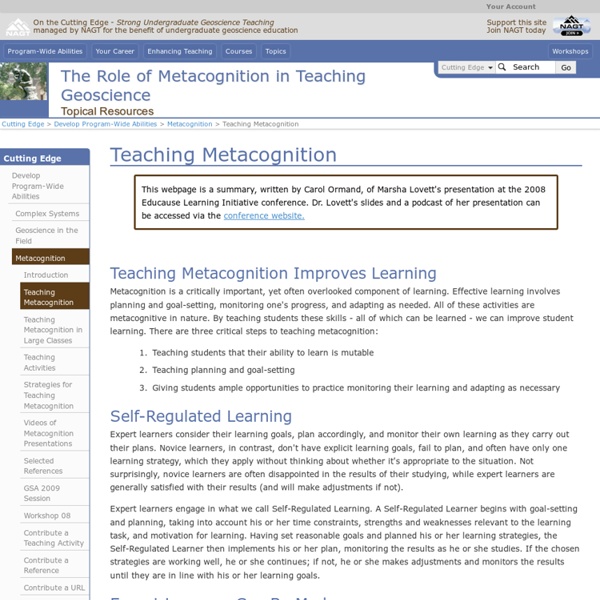Teaching Metacognition: The Value of Thinking About Thinking
July 10, 2012 by Bill Jenkins, Ph.D Research performed in the past few decades has demonstrated that we can improve reading skills by teaching students “metacognitive strategies.” By metacognition, we refer to enhancing one’s awareness of “what one believes and how one knows.” (Kuhn, 2000). In other words, the more we can teach students to be actively thinking about thinking as they learn, the more effective their learning will be. In fact, we can teach students to become what Marcia Lovett of Carnegie Mellon University calls “expert learners.” Teaching students that their ability to learn not only changes, but that they can affect how that ability develops, Teaching them how to plan for success and set goals, and Giving them lots of opportunities to monitor their learning and adapt their own learning strategies What exactly do such metacognitive learning strategies look like in the classroom? Give goals. References: Teaching Metacognition Metacognitive Strategies for Reading Comprehension
Metacognition and Student Learning - Do Your Job Better
By James M. Lang This evening, my family will sit down on the couch together to enjoy the opening episode of America's favorite spectacle of poor metacognition. Along with millions of others, including some of you, we will marvel at the sight of so many human beings eager to put their deficient cognitive skills on display for the world. I'm talking, of course, about the season premiere of American Idol, where lousy metacognition will join lousy singing for two cringeworthy hours tonight and another hour tomorrow night, as amateur musicians audition for the opportunity to win fame, fortune, and a recording contract. What makes so many of those atrocious singers laughable to us—excepting the ones who put on deliberately bad performances in order to get on camera—turns out to be a problem that plagues many undergraduates, especially the weakest among them: an inability to judge accurately their own level of skill or knowledge in a specific area. Yes, I know quite a few of those people.
Expanded Academic ASAP - Document
Full Text: Awareness of what one knows or doesn't know falls under the heading of metacognition, the active process of knowing. Students who are aware of their own cognitive state are able to adjust their performance when warranted (Huff & Nietfeld, 2009). Awareness determines the grounds on which students judge whether their engagement in an academic task matches the standards they have set for successful learning (Butler & Winne, 1995). Pintrich (2000) described self-regulation as "an active, constructive process" during which students monitor, regulate, and control their cognition, motivation, and behavior, suggesting that motivation as well as cognition is affected by self-regulation. The role of self-monitoring Butler and Winne (1995) described monitoring as "the cognitive process that assesses states of progress relative to goals and generates feedback that can guide further action" (p. 259). Feedback that occurs after a task is completed is defined as outcome feedback.
The LearnWell Projects | A Metacognitive Peer Tutoring Model: Linking Thinking, Learning and Performance in a Peer Tutoring Program
What can be gleaned from analyzing two years of metacognitive tutoring documentation reports? Invaluable insights into students’ thinking,Rare windows into how students’ interpret tasks,Clearer understandings of how learners define roles and responsibilities in learning environments,Common themes for how students interact with content across a broad array of academic domains. This article introduces a series of commentaries on metacognitive peer tutoring, each of which will offer useful insights into why students struggle and where they encounter problems in their learning routines. About the Data The data behind this series consists of 522 documentation reports collected during the 2012-2014 academic years. This article launches what I hope will foster dialog about metacognitive tutoring. In 2012, the National College Learning Center Association (NCLCA) awarded me the Brenda Pfaehler Professional Development Grant and encouraged me to develop a national metacognitive tutoring model.



